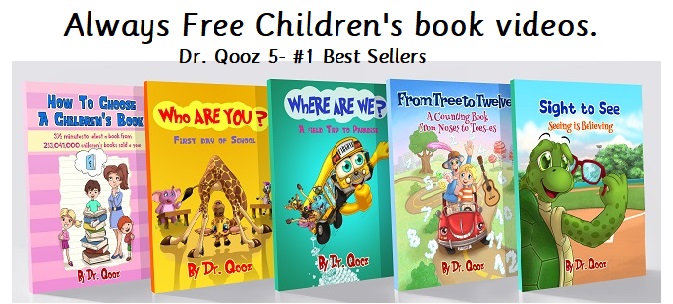
Reading aloud is about the spirit building and character influencing of Our Children, our National Treasure, our Future.
 Reading aloud to your child will have the greatest impact of all teaching you will render as a parent. So if you are going to teach the little darlings, lets give them reading fertilizer. Reading aloud to your child is the best way to prevent your child from being a nonreader.
Reading aloud to your child will have the greatest impact of all teaching you will render as a parent. So if you are going to teach the little darlings, lets give them reading fertilizer. Reading aloud to your child is the best way to prevent your child from being a nonreader.
- Each day of the week, a story of entertainment, personal growth, fun and mind development for the child that is now celebrating less than a decade of years should start with reading aloud for 15 to 20 minutes.
- Reading out loud to your child will place them at the head of any class they attend for the rest of their life.
- Starting to read 20 minutes a day will guarantee your child to be at the top of the list for college acceptance.
- Just 20 minutes of reading to your child will create a stronger bond, a homogeneous family, and a successful adult.
- Reading aloud to your child will create a tradition positive character building for generations to come. Dr. Qooz
Reading aloud means that you-read out loud to a child or another person. When we read to children, we take advantage of the fact that until about age 14, young people have a “listening level” that greatly surpasses their reading level. When we read aloud to kids, we engage them in text that they might not or cannot read.
SO when should we stop reading to a child? Two thirds of eighth graders (up to 14 years old) do not read at 8th grade level . (NAEP) SO KEEP READING TO THE 14 YEAR OLD!
Not all of the benefits of reading aloud are evident at first glance.
Educator Jim Trelease shares why reading aloud to your child, no matter what their age, is the secret for creating a reader for life.
Jim Trelease is the author of the million book seller, Read-Aloud Handbook., Parents and teachers alike cherish the 30 years of studies and data that Trelease has compiled that proves e child read to for 20 minutes a day excels in school and work above all other children that have not been read to.
The link between school success and reading aloud is explained in progress steps.
Research and science has long established that: the child who arrives at school with a large vocabulary does better than the child who comes to school with a small vocabulary and even less familiarity with words.
At the beginning years of school, almost all instructions are given orally. Children aren’t reading from kindergarten through third grades, or just starting to read, so the teacher talks to the kids to get them to understand instructions.
The teacher can’t tell the kids to open their textbooks and read the directions so she tells them what to do and the kids with the largest vocabularies are advantaged because they understand more of what the teacher is saying. The kids with smaller vocabularies don’t understand from the start, and they can fall further and further behind as time goes on.
How does a child develop a larger vocabulary before school starts?
- Children who are read to and most spoken to are often the kids with the largest vocabularies. There is not one word that comes out of the child’s mouth unless they have heard it before. The word “difficult.” Will not be spoken by a child unless he has heard it before. In most cases the child probably has to hear it multiple times to remember it and be comfortable enough to use it in their conversation. Unless it is a swear word and then the theory is that the child feels the emphasis the adult put on the word and realized the results of using the word to the audience was compelling.
- Parents talking to their children is important, but reading aloud to the child is equally important. Children are going to be hearing the most words in conversation. Unfortunately, most dialog is spoken in use verbal shorthand, not correct full sentences. When you toss in slang, slurs, ‘ums,’ grunts and regional colloquialisms, you just as well be speaking Greek, Hebrew, or Chaldean, because the child is not learning useful sentences that will grow their needed vocabulary. Most language in books is rich, complete sentences that add an occasional word to expand the child’s vocabulary. A child who hears more sophisticated words has a huge advantage over a child who hasn’t heard sophisticated words.
- Reading aloud increases a child’s attention span. Finally, the best encouragement to convince your child that reading is fun and needed is reading aloud to your child. Reading aloud, introduces your child’s to an appetite for reading. By making the daily ‘Read aloud’ event fun and important, the child becomes acutely aware of the importance to read. When a child becomes aware of reading then they develop a desire to read. Children emulate parents. If a child never sees Mom or Dad pick up a book, then it isn’t likely the child will ever develop a desire to read.
- Reading aloud to your kids is also are good way to broach difficult issues. Rather than lecture the child, find a book that addresses your issues. If you read a book about a child who gets in trouble by doing what you feel is not for your child then your child is going to experience that experience indirectly. Then you can talk about it together. By asking questions like: “Do you think the child in the story made the right choice?” “Do you think that character in the book was influence by their friends in a good or bad way?” Because the book character is a disinterested 3rd party, you and your child can discuss the issue you are concerned about and usually find out what issues or what went right and what went wrong in your child’s life. Books allow you to examine explosive situations without them blowing up in your face.
- Reading aloud allows your child to develop a sense of empathy and awareness of people outside your experiences. Your child will become aware of children that are not as privileged as they are. The realization of growing up with real advantages and disadvantages will help motivate the child to grow into more advantages. The result is the child learns the wider your world, the more you understand and the more opportunities they will have to live their dreams.
- Reading aloud increases the child’s attention span. If the child isn’t interested in the subject matter being taught or spoke of their learning abilities declined to zero. Reading aloud keeps the child’s attention focused so that they can learn unfettered. A child that has been read to want to learn to read by themselves.
- Reading aloud to your children gives you the chance to read the books you never read. This is an advantage to you of reading aloud. If you weren’t a proficient reader growing up, you will be amazed at the transformation that will occur in your vocabulary, vernacular, diction and conversation composition for the BETTER! If you were a good reader, reading aloud will make you a better conversationalist with a larger vocabulary.
- Reading aloud improves your child’s listening level. It is important that a child’s listening level and reading level comparable. If these two levels of comprehension are close the children will be able to grasp and comprehend what they read even if they are not at that level yet. A child’s reading level does not catch up to their listening level until about eighth grade. Sprinkle in books a grade ahead of your child’s level to stimulate their imagination and vocabulary growth.
